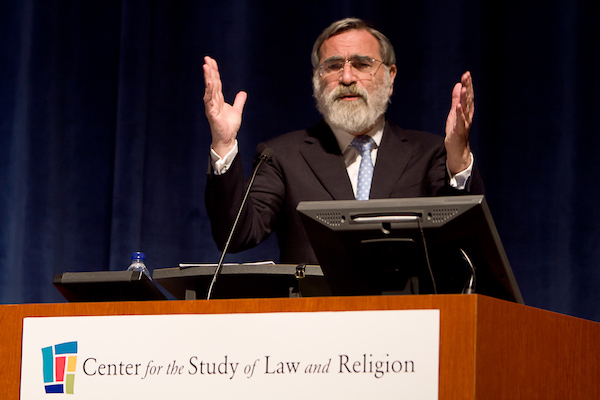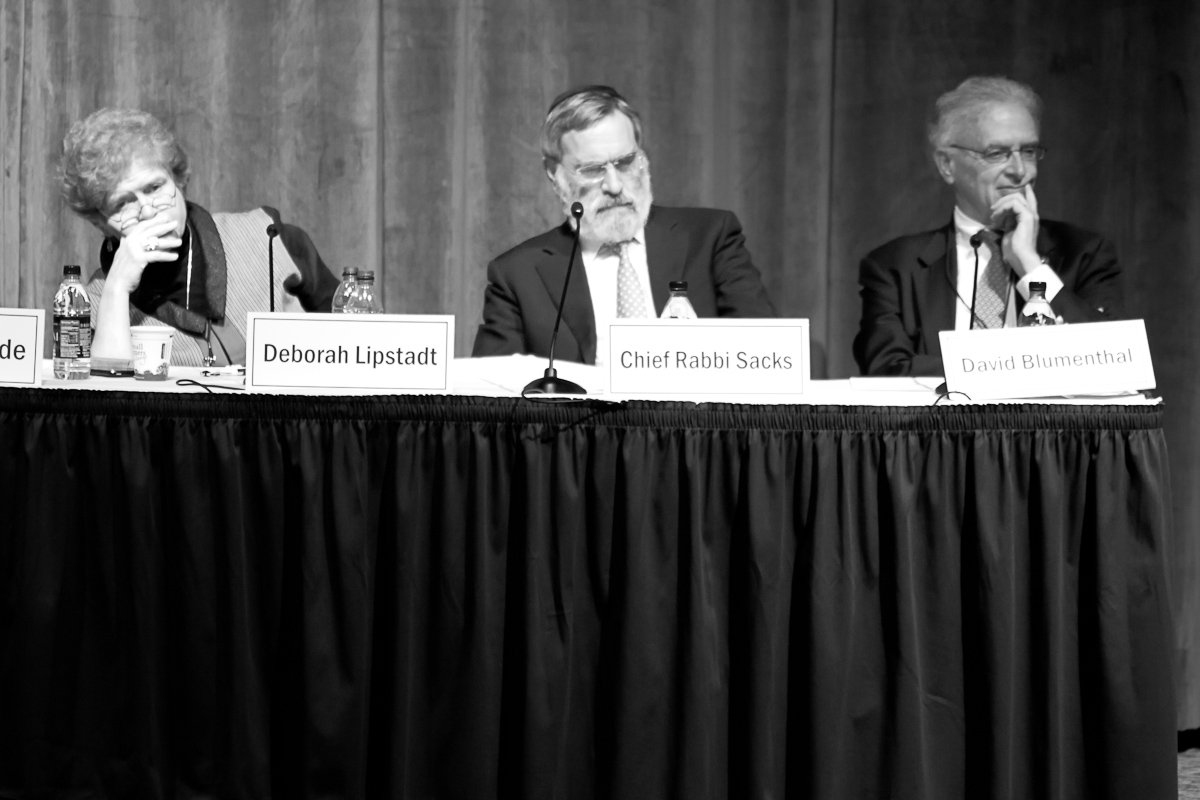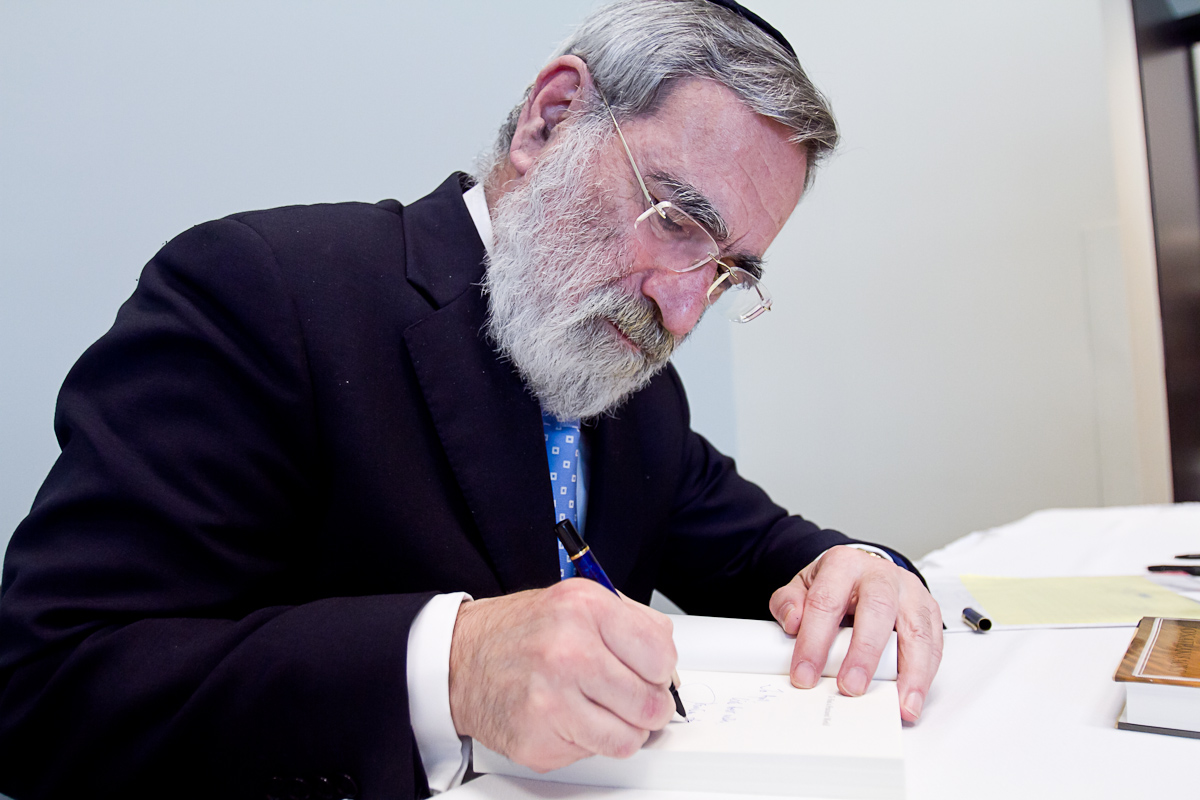CSLR Celebrates the Life of Rabbi Lord Jonathan Sacks
By CSLR | Emory Law | Nov 13, 2020 12:11:00 AM
 Play Video
Play VideoRemembering Rabbi Lord Jonathan Sacks
The Center for the Study of Law and Religion is mourning the loss of Rabbi Lord Jonathan Sacks (1948-2020). Rabbi Sacks was a prominent figure and a widely respected leader in the religious world. As an Orthodox Jewish rabbi, he was a prominent voice on questions of modern religion, morality, and religious inclusivity. His many contributions to the literature on Jewish law and religion include his 2014 article in the Journal of Law and Religion where he discussed the notion of happiness from a Jewish perspective. In 2010, he joined a panel of Jewish leaders at CSLR to talk about happiness and the Jewish tradition. You can watch his full remarks above.
Rabbi Sacks was a former Chief Rabbi of the United Kingdom, serving the position of Chief Rabbi of the United Hebrew Congregations for 22 years (1991-2013). In 2005, Rabbi Sacks was knighted by Her Majesty The Queen and made a Life Peer, entitling him to a seat in the House of Lords which he took in 2009. Rabbi Sacks’ many accolades include the Templeton Prize in 2016, the Lifetime Achievement Award by the London Jewish News in 2018, the Irving Kristol Award from the American Enterprise Institute in 2017, and the Bradley Prize in 2016. Throughout his lifetime, Rabbi Sacks has made countless contributions to the academic field. He has taught at a multitude of universities, received no less than 18 honorary doctorates, and has authored over 30 books.
Globally, religious and non-religious communities alike are mourning the loss of Rabbi Sacks. H.R.H. The Prince of Wales described Rabbi Sacks as “a light unto this nation” and former British Prime Minister Tony Blair has referred to him as an “intellectual giant.” In light of his passing, individuals across the globe have spoken out about Rabbi Sacks’ positive impacts and lasting legacy. From statements and social media posts to the eulogies delivered at his funeral, individuals touched by his existence have all attempted to capture the profound loss marked by Rabbi Sacks’ death.
Notably, current British Prime Minister Boris Johnson mentioned Rabbi Sacks’ “profound impact on our whole country and across the world.” The current Archbishop of Canterbury, Justin Welby, commented on Rabbi Sacks’ devotion to religious life, noting that “we are all the beneficiaries of his wisdom.” CSLR’s Michael J. Broyde and David R. Blumenthal have similarly reflected on Rabbi Sacks’ impacts and mourned his loss. You can read their full statements below.
Some Reflections on the Intellectual Ideas and Ideals of Lord Chief Rabbi Jonathan Sacks, of blessed memory by Michael J. Broyde
I have always understood the intellectual ideals and ideas of the late Lord Sacks as revolving around four basic concepts that he pressed – sometimes in unison and sometimes separately – for his whole intellectual life.
First, Lord Sacks was deeply committed to the idea that Jewish life is fully compatible with the best of modern western thought. He was convinced of this, both in theory and in practice, and he lived that model and preached it. He also encouraged others to view our world through this window.
Second, Lord Sacks thought that being a moral person required hard work which does not come naturally even to good people. Goodness requires reinforcement and practice. He understood that one of the central purposes of the rabbinate was to help people be the good persons they want to be and can be.
Third, Lord Sacks believed in the value of dignity. The idea that nearly all people are worthwhile and possess a spark of the Divine was central to him. The basic goodness of people was essential to his world-view. He understood that people both needed and wanted to be treated with respect, all-the-while impressing on everyone that respect is something every person should receive and give.
Finally, Lord Sacks believed in the centrality of the State of Israel in modern Jewish life and that those of us who choose not to live there—himself (and I, too)—need to recognize what is the center of the orbit and what is on the periphery. He was one of the earliest great British rabbis to see this and he reshaped his community in light of this ideal and reality. Lord Sacks was comfortable with a Jewish life that is Israel-centric.
Our world has been dimmed by the absence of Rabbi Lord Jonathan Sacks.

Rabbi Lord Jonathan Sacks, In Memoriam by David R. Blumenthal
The importance of the work of Rabbi Lord Jonathan Sacks can be summed up in four principles that are so relevant to our life today.
Rabbi Sacks was a public intellectual who nurtured a culture of civility. He was literate in general and Jewish texts. He never diminished the other. He always respected the other, and simply made pertinent observations that were meant to be persuasive, even where he disagreed with his interlocutors.
Rabbi Sacks believed firmly in the “dignity of difference.” There are universals, but access to the universal is always, always through the particular. Thus, truth is universal but it is in the nitty gritty particularities of life that we find it. Thus, too, humanity is a universal concept but it is in the individuated identity of persons and peoples that humanity is to be found. To know our humanness, we must know ourselves and others. To know our humanity, we must know the particularity of Jewish or Christian, or American or British, identity. He believed in the chosenness of self, and of the other. The dignity of difference brings gracious coexistence.
Meaning is a universal but it is only to be known through the particularity of the culture or religion that teaches it. Personal meaning, too, is known only through the form it takes in the life of each individual. Meaning is not a science; it is an insight into our relationship to being and its diverse embodiments in the human spirit. As Rabbi Sacks put it: “The God of Abraham is the God of all humankind, but the faith of Abraham is not the faith of all humankind.” What does it mean to be a Jewish / Christian / Muslim / Hindu / socialist / libertarian doctor / lawyer / teacher / laborer?
There is no such thing as a decree that cannot be averted; no such thing as a predetermined fate, or a compulsion that cannot be broken. Judaism teaches that repentance, prayer, and charity reverse destiny. That remorse, supplication, and good deeds enable us to leave destructive patterns (sin) behind us and seek a better, more meaningful life. Turning from evil and toward good gives human beings hope.
Rabbi Lord Jonathan Sack’s death is a loss to us all. May his integrity and his dignity be an example to us all.


